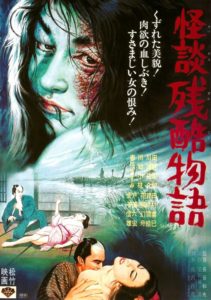 A 1968 film that until recently was thought “lost,” CRUEL GHOST LEGEND (KAIDAN ZANKOKU MONOGATARI) is a most engaging combination of the ghost and samurai Japanese movie tropes. As directed by the tragically little-known Kazuo Hase, whose other films are even more obscure than this one, it’s a skilled and stylish piece of work, albeit with an extremely wide-ranging, convoluted narrative.
A 1968 film that until recently was thought “lost,” CRUEL GHOST LEGEND (KAIDAN ZANKOKU MONOGATARI) is a most engaging combination of the ghost and samurai Japanese movie tropes. As directed by the tragically little-known Kazuo Hase, whose other films are even more obscure than this one, it’s a skilled and stylish piece of work, albeit with an extremely wide-ranging, convoluted narrative.
It all begins with Toyo, the wife of a high-ranking samurai, having back problems. She’s treated by Sojun, a blind acupuncturist. In lieu of payment the samurai offers to let the acupuncturist have sex with Toyo, but, unable to stand the sight of his wife being ravished by another man, kills the acupuncturist and then throws his corpse into a nearby river. Another acupuncturist is summoned to treat Toyo, but the samurai becomes convinced that it’s Sojun come back from the dead, and, in a psychotic frenzy, hacks up the guy—and in the process kills Toyo and himself. This gruesome act places a decades-long curse on the samurai’s descendants.
A few years later the samurai’s son Shinichiro, who’s become a real scumbag, starts up a sexual relationship with an attractive young woman acupuncturist named Ohana—who, it transpires, is the daughter of Sojun. She, however, dies during a bout of rough sex play, and Shinichiro uses the opportunity to take her money. More “good” luck comes into play when an old fencing master bequeaths his business to Shinichiro, who as a result becomes even wealthier. He also makes sure to kill everyone who might know about his crimes. But the old man finds out about Shinichiro’s true nature, requiring yet another killing. This time, however, the police are alerted, leading to a bloody showdown that concludes with Shinichiro being arrested.
Cut to ten years later: Shinichiro’s half-brother Shinzo, who as a child witnessed the gruesome double-murder that set everything in motion and has grown up to be every bit as vile as Shinichniro, finds himself ensnared with Toyosuga, an old hag who has inherited a fortune. Shinzo is stringing her along in the hope that she’ll die and leave him her money. But she finds herself struck with a mysterious facial deformity that causes her skin to waste away; Shinzo is disgusted but continues to string her along, at least until he discovers where she hides her money.
His plan is to simply steal the loot but Toyosuga catches him in the act and (you guessed it) he kills her. This would appear to leave him free to run off with his mistress, the young and pretty Ohisa, who like everything else in this twisted saga has a connection to the samurai whose actions set everything in motion.
Shinzo comes into contact with Shinichiro as the latter is being taken by authorities to his execution—which is set to occur on the banks of the same river where Sojun’s body was left so many years earlier. It’s there that Shinzo and Ohisa likewise meet their fate, which, you can rest assured, is plenty violent.
Relating such a wide-ranging narrative within a modest ninety minute framework results in very fast pacing and a jam-packed, decade-spanning narrative that’s often quite confusing. To help things along director Kazuo Hase and screenwriter Masashige Narusawa utilize copious voice-over dialogue to convey characters’ thoughts, which would probably seem a superfluous and annoying device in just about any other movie but makes sense here.
The film is quite impressively visualized in black and white photography that makes masterly, and quite innovative, use of light value and exposure. The film also contains a notably high gore quotient (with arterial blood geysers that look forward to the ultra-violent Yakuza pictures that emerged from Japan in the 1970s) to compliment the robust sexual content. CRUEL GHOST LEGEND, in short, was a film that was many years ahead of its time, which may explain why it’s been so widely, and unfairly, ignored.
Vital Statistics
CRUEL GHOST LEGEND (KAIDAN ZANKOKU MONOGATARI)
Shochiku Eiga
Director: Kazuo Hase
Screenplay: Masashige Narusawa
(Based on a novel by Renzaburo Shibata)
Cinematography: Hajime Kaburagi
Cast: Masumi Harukawa, Nobuo Kaneko, Saeda Kawaguchi, Yusuke Kawazu, Mutsuhiro, Hiroko Sakurai, Masakazu Tamura
